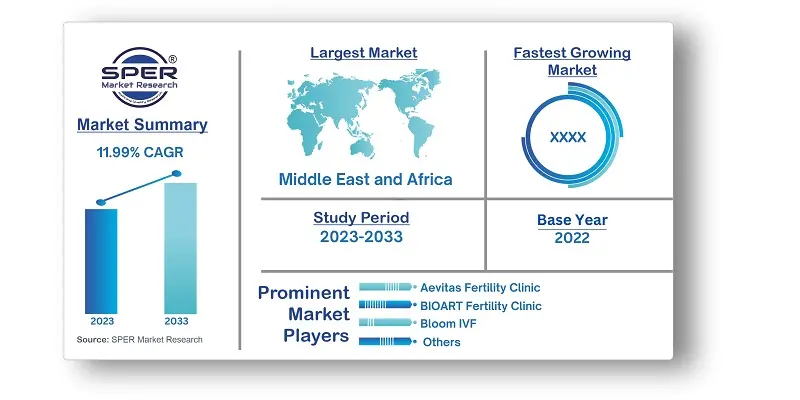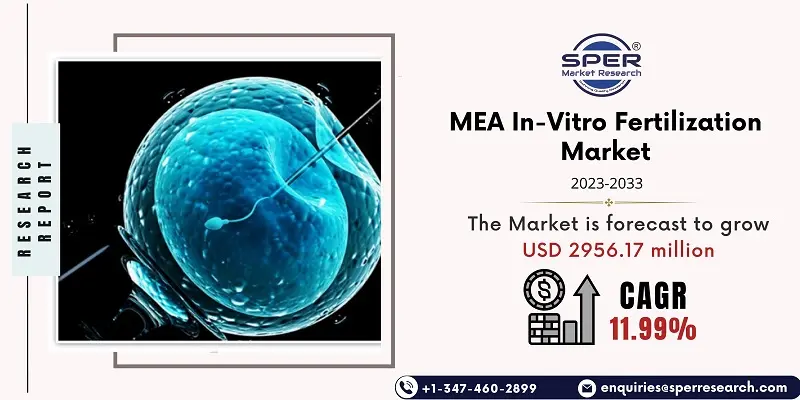
Middle East and Africa In-Vitro Fertilization Market Growth, Size, Trends, Share and Future Outlook
Middle East and Africa In-Vitro Fertilization (IVF) Market Size- By Cycle Type, By End User- Regional Outlook, Competitive Strategies and Segment Forecast to 2033
| Published: Feb-2024 | Report ID: HLCA2429 | Pages: 1 - 159 | Formats*: |
| Category : Healthcare | |||


| Report Metric | Details |
| Market size available for years | 2020-2033 |
| Base year considered | 2023 |
| Forecast period | 2024-2033 |
| Segments covered | By Cycle Type, By End User |
| Regions covered | South Africa, Saudi Arabia, UAE, Egypt, Kuwait, Israel, Rest of the Middle and Africa |
| Companies Covered | Aevitas Fertility Clinic, BIOART Fertility Clinic, Bloom IVF, CCRM Fertility, Gift ov life, Medic over. |
- Healthcare Providers
- Infertility Specialists
- Fertility Clinics
- Pharmaceutical Companies
- Medical Device Manufacturers
- Government Health Departments
| By Cycle Type: |
|
| By End User: |
|
| By Region: |
|
- Middle East and Africa In-Vitro Fertilization (IVF) Market Size (FY’2024-FY’2033)
- Overview of Middle East and Africa In-Vitro Fertilization (IVF) Market
- Segmentation of Middle East and Africa In-Vitro Fertilization (IVF) Market By Cycle Type (Fresh IVF Cycles, Thawed IVF Cycles, Donor Egg IVF Cycles)
- Segmentation of Middle East and Africa In-Vitro Fertilization (IVF) Market By End User (Fertility Clinics, Hospitals, Surgical Centres and Clinical Research Institutes)
- Expansion Analysis of Middle East and Africa In-Vitro Fertilization (IVF) Market
- Problems and Obstacles in Middle East and Africa In-Vitro Fertilization (IVF) Market
- Competitive Landscape in the Middle East and Africa In-Vitro Fertilization (IVF) Market
- Impact of COVID-19 and Demonetization on Middle East and Africa In-Vitro Fertilization (IVF) Market
- Details on Current Investment in Middle East and Africa In-Vitro Fertilization (IVF) Market
- Competitive Analysis of Middle East and Africa In-Vitro Fertilization (IVF) Market
- Prominent Players in the Middle East and Africa In-Vitro Fertilization (IVF) Market
- SWOT Analysis of Middle East and Africa In-Vitro Fertilization (IVF) Market
- Middle East and Africa In-Vitro Fertilization (IVF) Market Future Outlook and Projections (FY’2024-FY’2033)
- Recommendations from Analyst
1.1. Scope of the report1.2. Market segment analysis
2.1. Research data source2.1.1. Secondary Data2.1.2. Primary Data2.1.3. SPER’s internal database2.1.4. Premium insight from KOL’s2.2. Market size estimation2.2.1. Top-down and Bottom-up approach2.3. Data triangulation
4.1. Driver, Restraint, Opportunity and Challenges analysis4.1.1. Drivers4.1.2. Restraints4.1.3. Opportunities4.1.4. Challenges4.2. COVID-19 Impacts of the Middle East and Africa In-Vitro Fertilization (IVF) Market
5.1. SWOT Analysis5.1.1. Strengths5.1.2. Weaknesses5.1.3. Opportunities5.1.4. Threats5.2. PESTEL Analysis5.2.1. Political Landscape5.2.2. Economic Landscape5.2.3. Social Landscape5.2.4. Technological Landscape5.2.5. Environmental Landscape5.2.6. Legal Landscape5.3. PORTER’s Five Forces5.3.1. Bargaining power of suppliers5.3.2. Bargaining power of buyers5.3.3. Threat of Substitute5.3.4. Threat of new entrant5.3.5. Competitive rivalry5.4. Heat Map Analysis
6.1. Middle East and Africa In-Vitro Fertilization (IVF) Market Manufacturing Base Distribution, Sales Area, Product Type6.2. Mergers & Acquisitions, Partnerships, Product Launch, and Collaboration in Middle East and Africa In-Vitro Fertilization (IVF) Market
7.1. Middle East and Africa In-Vitro Fertilization (IVF) Market Value Share and Forecast, By Cycle Type, 2024-20337.2. Fresh IVF Cycles7.3. Thawed IVF Cycles7.4. Donor Egg IVF Cycles
8.1. Middle East and Africa In-Vitro Fertilization (IVF) Market Value Share and Forecast, By End User, 2024-20338.2. Fertility Clinics8.3. Hospitals8.4. Surgical Centres and Clinical Research Institutes
9.1. Middle East and Africa In-Vitro Fertilization (IVF) Market Size and Market Share
10.1. Middle East and Africa In-Vitro Fertilization (IVF) Market Size and Market Share By Cycle Type (2020-2026)10.2. Middle East and Africa In-Vitro Fertilization (IVF) Market Size and Market Share By Cycle Type (2027-2033)
11.1. Middle East and Africa In-Vitro Fertilization (IVF) Market Size and Market Share By Region (2020-2026)11.2. Middle East and Africa In-Vitro Fertilization (IVF) Market Size and Market Share By Region (2027-2033)11.3. South Africa11.4. Saudi Arabia11.5. UAE11.6. Egypt11.7. Kuwait11.8. Israel11.9. Rest of the Middle and Africa
12.1. Aevitas Fertility Clinic12.1.1. Company details12.1.2. Financial outlook12.1.3. Product summary12.1.4. Recent developments12.2. BIOART Fertility Clinic12.2.1. Company details12.2.2. Financial outlook12.2.3. Product summary12.2.4. Recent developments12.3. Bloom IVF12.3.1. Company details12.3.2. Financial outlook12.3.3. Product summary12.3.4. Recent developments12.4. CCRM Fertility.12.4.1. Company details12.4.2. Financial outlook12.4.3. Product summary12.4.4. Recent developments12.5. Gift ov life12.5.1. Company details12.5.2. Financial outlook12.5.3. Product summary12.5.4. Recent developments12.6. Medic over12.6.1. Company details12.6.2. Financial outlook12.6.3. Product summary12.6.4. Recent developments12.7. Others
SPER Market Research’s methodology uses great emphasis on primary research to ensure that the market intelligence insights are up to date, reliable and accurate. Primary interviews are done with players involved in each phase of a supply chain to analyze the market forecasting. The secondary research method is used to help you fully understand how the future markets and the spending patterns look likes.
The report is based on in-depth qualitative and quantitative analysis of the Product Market. The quantitative analysis involves the application of various projection and sampling techniques. The qualitative analysis involves primary interviews, surveys, and vendor briefings. The data gathered as a result of these processes are validated through experts opinion. Our research methodology entails an ideal mixture of primary and secondary initiatives.



Frequently Asked Questions About This Report
PLACE AN ORDER
Year End Discount
Sample Report
Pre-Purchase Inquiry
NEED CUSTOMIZATION?
Request CustomizationCALL OR EMAIL US
100% Secure Payment






Related Reports
Our Global Clients
Our data-driven insights have influenced the strategy of 200+ reputed companies across the globe.




















